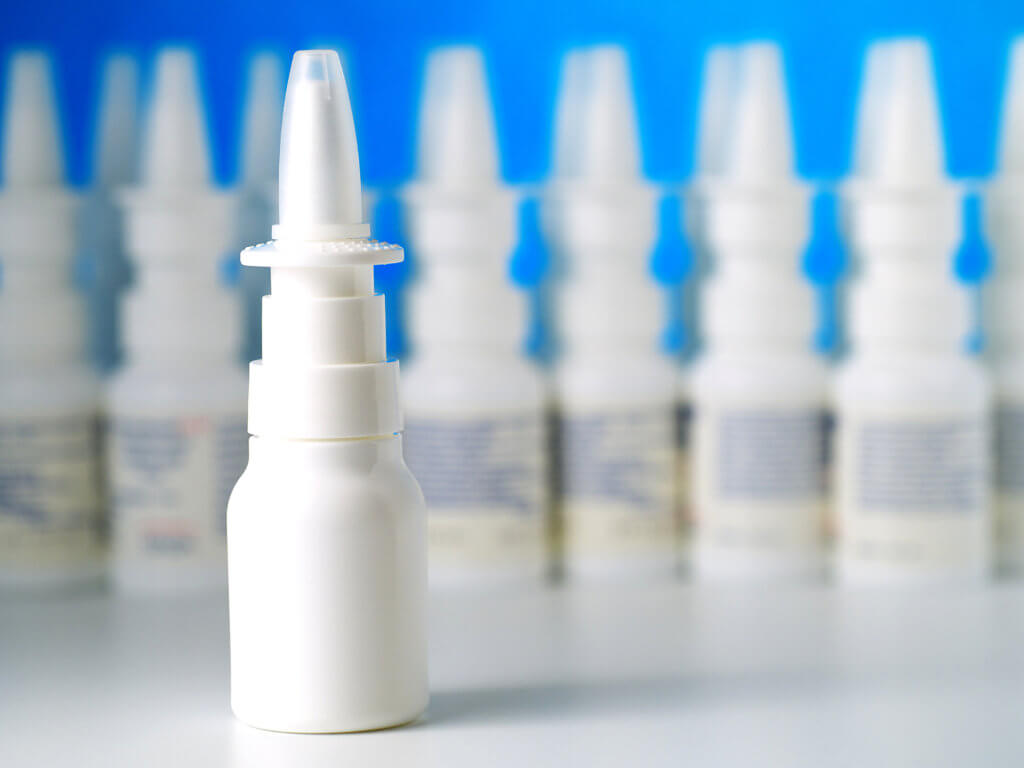A new nasal spray may hold the key to saving people from both epilepsy and Alzheimer’s disease. Researchers from the Medical College of Georgia at Augusta University say the spray uses a novel peptide that boosts the brain’s ability to prevent seizures and protect neurons.
Specifically, the team developed the A1R-CT peptide which shows the ability to tamp down uncontrolled electrical activity in the brain. This is a common problem after a traumatic brain injury or stroke, as well as a symptom affecting more than half of all Alzheimer’s patients.
Neuropharmacologist Dr. Qin Wang adds that the development of a nasal spray could turn A1R-CT into a seizure rescue medication. The drug would be able to interrupt epileptic seizure clusters — where debilitating seizures in epilepsy patients occur back-to-back.
How does the peptide work?
A1R-CT inhibits neurabin, a protein that ensures the brain’s protective mechanism reduces hyperexcitability in the neurons, so the protein doesn’t overdo this. The peptide gets its name from the protective adenosine 1 receptor on the surface of neurons. Adenosine, a chemical mainly produced to neuron-supporting glial cells in response to hyperexcitability, activates this receptor.
“This is a powerful receptor to then silence the neurons,” Wang says in a university release.
Study authors add that this naturally calming relationship also blocks electrical activity that can cause an irregular heartbeat. Moreover, an injectable form of adenosine already exists and helps to treat people with very high heart rates.
“But the A1 receptor itself has to be regulated because if it’s activated too much, you will fall asleep. The neurons try to make sure everything stays in control and in most of us, it works pretty well. We don’t fall asleep at our desk. We don’t have seizures,” Wang adds, noting that caffeine blocks the A1 receptor.
While memory loss is a more common symptom, Alzheimer’s can also cause seizures when the buildup of amyloid and tau proteins disrupts communication between neurons in the brain. This also leads to more oxidative stress and inflammation, making neurons hyperexcited.
“In Alzheimer’s there are so many things that go wrong,” Wang says.
Unleashing A1’s power
Study authors note the A1 receptor’s activation by adenosine is something that’s pervasive throughout the human body, making the risk for side-effects highly likely. This is where neurabin comes into play. The study reveals that since neurabin is primarily in the brain, it provides the balance to prevent hyperactivity of the A1 receptor.
“Neurabin is a brake, so it doesn’t do too much,” Wang explains. “But now we need to remove it to unleash A1’s power.”
With that in mind, the team developed a peptide that can interfere with the A1 receptor and neurabin’s interaction — creating a more naturally protective effect that reduces seizures.
A1 receptor activation calms down the excited neurons by altering their ion channels — proteins in the cell that allow for the passage of other proteins around the cell. This process helps to generate healthy electrical signals in the cells. The result is called hyperpolarization, meaning neurons are less likely to fire an electrical signal.
“The more polarized the neurons are, the harder it is for them to get excited,” Wang says.
Activating the A1 receptor also reduces the release of glutamate, a neurotransmitter that neurons produce — which also excites those same neurons. The study found a dramatic reduction in the death of neurons among Alzheimer’s patients after using the peptide.
By inhibiting neurabin, the peptide enables A1C to reduce excessive electrical activity in the brain. In lab mice suffering from severe seizures, injecting them with the peptide lowered their symptoms.
Turning the peptide into an easy-to-use nasal spray
The scientists found similar results among seizure and Alzheimer’s models after turning the original injection into a nasal spray.
To emphasize the importance of neurabin, study authors say mice with a neurabin deficiency had significantly shorter and less severe seizures. Moreover, all of the mice survived.
However, those with normal neurabin levels experienced seizures that lasted for up to 30 minutes and 10 percent of the mice died after their episodes. Blocking the A1 receptor in neurabin-deficient mice led to more than 50 percent of the mice dying from their seizures.
The team is now exploring the ideal doses and delivery times to treat certain conditions with this peptide. They are continuing to tweak the nasal spray while they pursue funding to begin clinical trials.
The study is published in the journal JCI Insight.













And this will be the last time you hear about this groundbreaking nasal spray.
Lol
Yep, because they have no clinical trials to date. R&D peptides are a dime a dozen; all with fanciful claims and most wither away into obscurity due to lack of safety and efficacy data.
Until they tell you ot also cures baldness.
What effect does this have on someone who is already suffering from Alzheimer’s?
Biden will require a full time ventilator with that stuff.
I am 67 and very excited to read about this discovery. My mother lived to be 93 and had Alzheimer’s the last couple of years of her life. How long do you anticipate before this treatment will be available to human patients?
I would prefer the suppository
is that where your brain is?
couldn’t resist.
I would be very interested to know if this would work on dogs.
I think a big case should be sent today to:Donald J. Trump
c/o The Mar-a-Lago Club
1100 South Ocean Boulevard
Palm Beach, Florida 33480
C.O.D….$99,000
You should probably concentrate on treating your own advanced Trump Derangement Syndrome. Please just keep taking your anti-psycotic meds and leave running the country to those with the mental capacity for it.
You think President Biden lives at Donald Trump’s house?
Put your government mask back on and watch poopy diaper Uncle Joe make a mockery out of your lunatic ravings.
It is apparent you are suffering from TDS (Trump Derangement Syndrome). It is abundantly clear that the current president is suffering from Alzheimer and should take it and maybe he will be aware of the elder abuse he is suffering.
We don’t trust these folks anymore
Really. You tout this grand achievement and they have yet tested this in blinded human clinical trials. All theoritcal at this point and not even worthy writing an article about it. When they have safety and efficacy data in a thousand human patients, then we can talk.
When that flowerpot hit me in the head, I gave it a piece of my mind.
If I sniff A1R-TC HighTide, my sanity will be restored?
Gimee!
Is this an ad?
Thanks Chris for this very informative article. Sounds like this is a great start to both AlZ & Epilepsy treatments.
But a start, as you & I know clinical trials can take awhile. I’m assuming on this you would need trials Phase I, II, and III.
My mom had ALZ for 10yrs before she passed away, both ALZ & Epilepsy are very disabling diseases. Thanks for the article. This new info is hopeful & something to look forward to into the future.
We need to run a pipeline to the White House and shove a hose up Joe’s schnozz…
Exactly. Anytime I see any type of medical breakthrough, I hesitantly look, and then discard it. My Dad has Parkinsons and the amount of “breakthroughs” I’ve read about were all disappointing as in they will never see the light of day for at least 20 years. No need to get any hopes up, that’s for sure.
Fausci will have a bonefide “vaccine” for Alzheimers “free” care of your retirement savings losses … after sleepy Joe’s handlers pass the next stimulus package inducing more record inflation.
I bet you dollars to donuts that this stuff is already in use in DC.
That’s what they said about the Covid vaccine.
Scientists and big pharma never ‘cure’ anything anymore. This will be one more recurring revenue stream for them with 500million wide-eyed hopefuls shelling out money and snorting this stuff everyday while Phizer, etc reap the rewards. Just like the fake WuHan flu shots.
I’d settle for a cure for LDS (Limp-Dick-Syndrome)
Better rush it to the White House! Just think of all the dirty Depends that are going into the landfills thanks to biden’s pooping himself.
Oh like i will ever believe a Dr or any new Medicine they push again.
Cure will only happen under a Donald Trump White House. The Socialist pigs who hijacked our government know our seniors wont vote for them anymore. We are now dispensable! Not only are these Socialist pigs antisemitic, they’re also anti-senior!
Cannabis does the same thing and has been cultivated for 10k years
I will pass on anything they say now and avoid all “doctors” like the plague they are.
They already killed my daughter with their Gardasil vax.
#GardasilKilledJessica ~ 12/16/1993-12/24/2013
How soon will Slow Joe get his and how soon will it be adding to Pfizer’s bottom line?